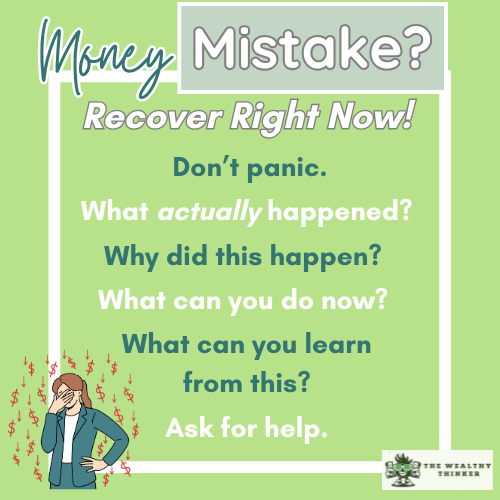Hey there. Take a deep breath.
If you’re reading this, chances are you’ve just realized you’ve made a financial misstep, an money mistake if you will, and your mind is racing with worry and regret.
First things first: it’s going to be okay. We’ve all been there, and you’re not alone. Let’s walk through this together, step by step, and figure out how to move forward.

7 Immediate Ways to Recover From Making a Money Mistake
1. Don’t Panic or Feel Ashamed.
Listen, making a money mistake doesn’t mean you’re a bad person or a failure.
It makes you human.
Financial mishaps happen to everyone, from regular folks to billionaires. The fact that you’re here, looking for help, shows that you’re responsible and committed to improving your situation. That’s something to be proud of.
Remember:
- Your net worth doesn’t define your self-worth.
- This mistake doesn’t erase all your past financial successes.
- You’re not alone – financial slip-ups are more common than you think.
Take a moment to be kind to yourself. You wouldn’t criticize a friend who made a mistake, so don’t do it to yourself.
2. Assess the Situation.
Now that we’ve taken care of your emotional well-being, let’s look at what happened.
Grab a pen and paper (or open a note on your phone) and jot down answers to these questions:
- What exactly happened? Be specific about the mistake.
- How much money is involved?
- What immediate consequences are you facing?
- Are there any long-term implications you’re worried about?
Writing it down can help you see the situation more clearly and often makes it feel more manageable.
3. Understand the ‘Why’.
Understanding why this happened is crucial for preventing future mistakes.
Let’s dig a little deeper:
- Was this an emotional decision?
- Were you stressed, excited, or trying to feel better?
- Did you act on impulse? If so, what triggered that impulse?
- Were you missing some key information? If yes, what information did you need?
- Did outside pressure influence your decision? From friends, family, or society?
- Were you trying to take a shortcut to financial success?
Be honest with yourself. The goal isn’t to assign blame but to understand your triggers and decision-making process.
5 Common Money Mistakes That Will Cost You Big Time
4. Damage Control: What Can You Do Now?
Okay, let’s look at how we can improve the situation:
- Can you return or exchange something you bought?
- Is there a way to undo or reverse the financial decision?
- Can you sell something to recoup some losses?
- Is it possible to negotiate with any involved parties (like creditors or sellers)?
- Do you need to adjust your budget to account for this setback?
Remember, taking action, even small steps, can help you feel more in control and positive about your situation.
5. Learn and Plan for the Future.
Now, let’s turn this setback into a setup for future success:
- What’s the biggest lesson you’ve learned from this?
- How can you set up safeguards to prevent this from happening again?
- Do you need to educate yourself on any financial topics?
- Would it help to have an accountability partner for financial decisions?
- Should you create a ‘cooling-off’ period for big financial choices?
Write down your plan. Having it on paper makes it more real and actionable.
6. Seek Help If You Need It.
There’s no shame in asking for help. In fact, it’s a sign of strength and wisdom.
Consider:
- Talking to a trusted friend or family member for support
- Consulting with a financial advisor for professional guidance
- Using budgeting apps or tools to help manage your finances
- Joining a support group or online community for people working on financial goals
Remember, even financial experts seek advice from others. You don’t have to figure everything out alone.
7. Move Forward with Confidence.
You’ve reflected, learned, and planned on your money mistake. Now it’s time to move forward.
Here’s your pep talk:
- This mistake doesn’t define your financial future.
- You now have valuable experience that will inform better decisions.
- Every financial success story includes setbacks – this is just part of your journey.
- You’re already ahead of many people simply by addressing the issue head-on.
Final Thoughts: Your Financial Resilience Toolkit
Keep this article handy for any future financial wobbles.
Here are some quick tips to build your financial resilience:
- Practice self-compassion: Treat yourself with the same kindness you’d offer a friend.
- Maintain perspective: Ask yourself, “Will this matter in 5 years?”
- Focus on solutions: For every problem, brainstorm at least two possible solutions.
- Celebrate small wins: Acknowledge every positive financial step, no matter how small.
- Stay flexible: Remember that setbacks are part of the journey, not the end of it.
- Keep learning: Commit to ongoing financial education.
Remember, making a money mistake doesn’t make you bad with money.
It makes you someone who’s learning and growing.
Financial wellness is a journey, not a destination, and every step – even the missteps – brings you closer to your goals.
You’ve got this. And if you ever doubt that, come back and read this again. We believe in you!



















